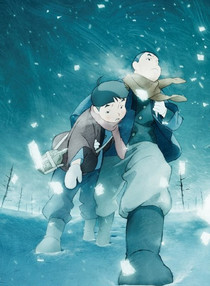Review
by Todd Ciolek,Giovanni no Shima
| Synopsis: |  |
||
The Kuril Islands lie northeast of Hokkaido. Originally inhabited by the Ainu, the isles were claimed by Japan in the middle of the 19th century. That changed after World War II, when the Soviet Union took over the four islands—including Shikotan, where two boys will make new friends and learn cruel lessons in the wake of the conflict. |
|||
| Review: | |||
Shikotan is a comfortable home to Junpei and his little brother Kanta—or Giovanni and Campanella, as their father respectively nicknames them in homage to Kenji Miyazawa's Night on the Galactic Railroad. Dad's also the commander of the local military detachment, so it's a particularly crushing blow when the war ends. The entire isle braces for an American takeover, but it's the Soviet military that shows up and claims Shikotan and the rest of the Kuril Islands. It's a true invasion at first: a Red Army detachment holds classrooms at gunpoint, homes are raided, and the nicest dwellings are claimed by the island's new owners. Junpei's family moves next door while the local Soviet commander moves into their former home. Yet things improve: the Soviet and Japanese children eventually get along at school, and the commander has a young daughter named Tanya. It isn't long before she makes friends with Junpei and Kanta…and becomes Junpei's first childhood crush. Giovanni's Island meets every prerequisite for a typical story of children dealing with the hardships of war, in its aftermath if not its midst. Before long, something shatters the fragile fellowship between the islanders and their occupiers, and Junpei and Kanta are forced off the isle alongside many other families. Accompanied by their teacher Sawako and their shiftless uncle Hideo, the boys land in a refugee camp. There they learn that their father's in a prison nearby, and they set forth on a journey that couldn't possibly have a happy ending. It's a tale of lost innocence and crushing adversity, and Giovanni's Island captures it nicely. The film's fluid look, achieved largely with hand-drawn animation, gives an appropriate simplicity to Junpei and Kanta's childhood, whether it's spent befriending Tanya or enduring a wintertime trek over mountains. It also makes it easy for director Mizuho Nishikubo (whose resume includes everything from California Crisis: Gun Salvo to Ghost in the Shell) to weave in abstract visions of Night on the Galactic Railroad. The boys turn to the fable when things get rough, and their glittering starfield visions contrast powerfully with the unpleasant reality of things. The film doesn't ignore the unavoidable costs (anyone familiar with Miyazawa's book will know what's coming), and its abstractions are all the more haunting because of it. Yet Giovanni's Island goes precisely where you'd expect. It picks a path already worn down by many films about kids grappling with war's effects, from Hope and Glory and Au Revoir Les Enfants to anime productions like Rail of the Star and Grave of the Fireflies. Giovanni's Island isn't quite as harsh as some of its predecessors, on account of a strangely upbeat ending, but it has all of the base ingredients: idyllic youth lost forever, children bonding despite their differences, inevitable deaths and sacrifice, and the persistence of hope through it all. The film handles it ably, but it doesn't offer much beyond the routine stories of friendships and families torn apart in the wake of conflict. Indeed, some potentially intriguing venues are rushed to the side. Tanya disappears from the movie once the island is left behind, and the relationship between Junpei's father, Sawako, and Uncle Hideo isn't given the attention it invites. Nor is Giovanni's Island concerned with the larger issues of the war. Confined to a child's viewpoint, the film never discusses exactly what Japan did during World War II. It's merely sad when the island's soldiers shuffle off in defeat, because that's how a kid would see it. It's never explained why the island's women hide themselves from the Soviets, because a kid wouldn't wonder too much about that. This will disappoint those trenchant political analysts who look for universal acknowledgements of wartime atrocities in Japanese films (and see anything less as apologist agitprop), but it keeps Giovanni's Island from biting off more than a story about children could really take. At the film's North American premiere, writer-producer Yoshiki Sakurai stated that he wanted it “to be international,” reflecting post-war hardships across the world. At that, it's a success. As much as Giovanni's Island avoids overt politics, it can't avoid them entirely, not when it comes to the Kuril Islands dispute that continues even today. It's revealed in glimpses of how no one's happy with the occupation. Tanya laments that her military family has moved constantly, and a displaced Korean woman grumbles that no one's taking her people home. That can't help but back an argument that only Japan belonged on the islands, and that Russia definitely should return them. Giovanni's Island is as powerful as it is predictable. It may be one of the few films (and the only animated film) to focus on the Kuril Islands, but its tale will prove immediately familiar to anyone acquainted with cinema's typical treatments of war-torn children. Yet the film turns that to the advantage. It makes a lesser-known vestige of World War II into a story universal in its loss and redemption. We've seen this before, and that's what makes it so tragic. |
|
The views and opinions expressed in this article are solely those of the author(s) and do not necessarily represent the views of Anime News Network, its employees, owners, or sponsors.
|
| Grade: | |||
|
Overall (sub) : B
Story : B-
Animation : B+
Art : A-
Music : B+
+ Gentle animation and cosmic interludes bring it alive |
|||
| discuss this in the forum (13 posts) | | |||
| Production Info: | ||
|
Full encyclopedia details about |
||